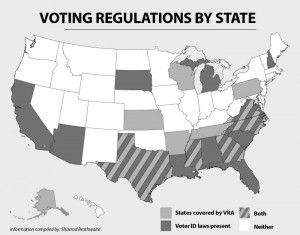Voter laws spread throughout VRA states
October 9, 2013
Multiple states are changing their voting standards as state assemblies across the nation pass bill upon bill, demanding changes to voting procedures.
The most publicized example of the new voter ID laws is North Carolina’s Voter Identification Verification Act (VIVA), which increases the strictness of voter identification requirements and adjusts the voting practices of N.C. in ways that seem bent on making it more difficult.
For the time being, Georgia’s state congress has not made motions to pass a law of VIVA’s scope. However, the state does already have voter identification requirements in place.
The likelihood of further voter identification laws being passed in Georgia is unknown, but there are steps a student can take to ensure that his or her right to vote is protected.
The easiest way to stay abreast of new voter legislation is by actively searching online information on where polling sites will be and registering early, Robert Pirro, Ph.D., Georgia Southern University political science professor, said.
Students who are registered voters of Statesboro can vote early to elect the next mayor of Statesboro from Oct. 14 – Nov. 1. Election Day is Nov. 5, according to the Bulloch County website.
“Members of the SGA and other student organizations, to the extent that they are more informed about politics and more committed to participating in politics, should be doing all they can to facilitate student voting,” Pirro said.
Bills have passed in the wake of the Supreme Court’s decision to annul Section 4 of the Voting Rights Act (VRA), which helped to force states with histories of voter discrimination to have all voting bills approved by the Department of Justice (DOJ).
The removal of this clause has led to the arrival of new voter identification laws, which have sprung up around the nation, calling for stricter identification requirements at the ballot.
“Requiring ID, especially photo ID, makes it more difficult to vote,” Pirro said. “So, for example, it becomes more difficult for college students to register to vote and vote at school, and if the early voting period is cut down, it makes it more difficult for students to get to their parents’ home to vote there. These restrictions are featured as well in the North Carolina voter ID law.”
The argument for the use of such mandates is that the bill is in place to prevent voter impersonation, or voter fraud.
However, evidence calling for such measures has not been found.
“These voter ID laws have not been justified by references to any significant case of in-person voter fraud,” Pirro said. “In fact, in the case of Pennsylvania’s voter ID law, the state, which was controlled by Republicans – who also passed the voter ID law – stipulated in court documents that it ‘would not offer any evidence that in-person voter fraud had in fact occurred in PA and elsewhere’.”
While VIVA and its fellow voter ID bills may actually be innocent in intent, questions are most definitely raised about their effects.
Jeffery Crowther, political science professor at GSU, believes the necessity of such voting acts is in doubt.
“That means the Voting Rights Act worked,” Crowther said. “In which case, there is no need to fix it.”









